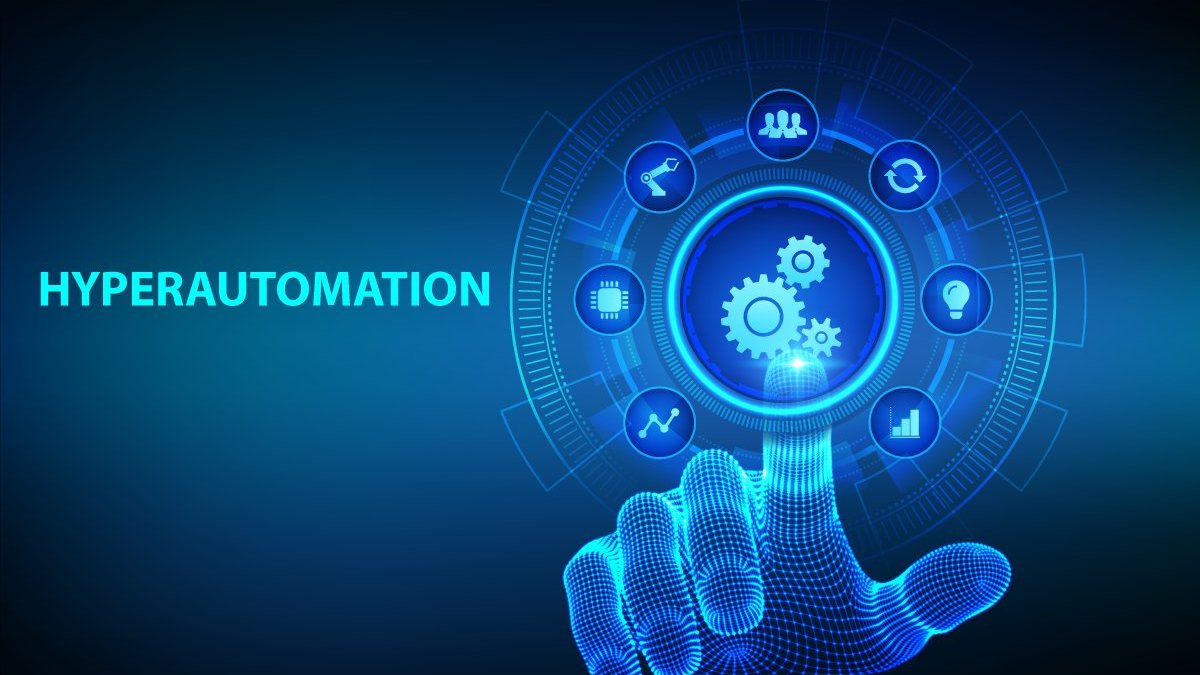
Hyperautomation books will bring us closer to understand how RPA and AI will work in the future.
Hyperautomation is a new phenomenon in the business world but it will play important role in the future. The concept of hyperautomation is closely connected to AI enabled tools and RPA (Robotic Process Automation).
What Is Hyperautomation?
Hyperautomation is when AI tools and robots are interconnected and capable to solve real life complex problem together. In case of hyperautomation AI devices and tools are using inputs and outputs that people may also understand, which makes the whole framework flexible.
Hyperautomation is the use of AI in order to increase efficiency and productivity. It allows companies to perform tasks that would otherwise be difficult or repetitive to do manually. This can save time and energy, and make the value generation more efficient. Hyperautomation has many benefits for both businesses and workers.
What Are Some Real Life Examples?
This technology can be used in a variety of industries, including manufacturing, transportation, and medical.
- Legal: An automatic NLP engine “reads” a certain case and automatically lookup to the possible connecting past legal cases
- Logistics: Automatic home delivery systems
- Stores: Automatic checkout systems that require no cashier and connected to other automatic systems like AI pricing or restocking system
- Markets: Article sentiment analysis and mood forecast for certain stocks or currencies. The same approach could be used for risk evaluation
What Are Typical Technologies That Fuel Hyperautomation?
- Machine vision – identifying certain characters, objects or their quality on a picture
- OCR (Optical Character Recognition) – scanning documents and turning them into digital text
- NLP (Natural Language Processing) – big language models like GPT-3
- Recommendation, classification with Machine learning – training ML models and reuse them into a new setup to help making optimal decision
- AI voice recognition
Now let’s see the most relevant Hyperautomation books to read to kick start this trend in your own business:
What Are The Best Hyperautomation Books?
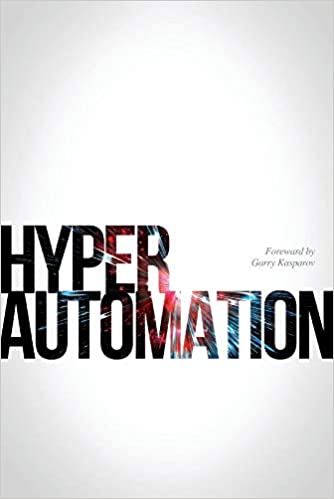
Hyperautomation, Matt Calkins et. al. by (2020)
From multiple authors, Hyperautomation is an essay collection on the core topic of integrating AI with business processes.
The essays are about how AI tools could be connected to together with the use of low-code approach in order to improve efficiency and accuracy. The essays provide a detailed overview of various automation features that are currently available, as well as future prospects for the combined use of AI and automation.
Overall, this is one of the best hyperautomation books that provides an excellent overview of the current state of hyperautomation and its potential benefits for businesses.
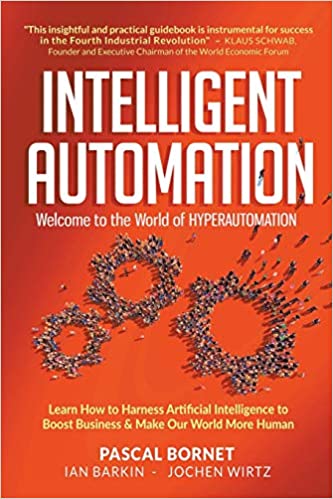
Intelligent Automation, by Pascal Bornet, Ian Barkin, Jochen Wirtz (2020)
AI is quickly becoming an important tool for businesses and organizations of all sizes. Hyperautomation, or the use of AI to automate tasks, can be a powerful way to improve efficiency and boost business. In this hyperautomation book the authors show an investigation into the latest trend in automated technology, referred to as hyperautomation. It is characterized by the combination of methods and technology involved, which include people, groups, machine learning, natural language processing, computer vision, robotic process automation, and more.
What hyperautomation is good for? First of all it could help you to reduce costs by automating and connecting tasks that are currently performed by only humans. This can save you time and money on things like routine paperwork, data entry, and customer service interactions.
On the other hand it can speed up processes. Hyperautomation can speed up multiple processes by automating tasks that are currently done manually above that the communication time between the end agent (either human or AI tool) are reduced. For example, imagine a company that produces marketing materials. By using hyperautomation, they could have a machine generate all the necessary documents automatically using the proper AI selected template without needing any human input!
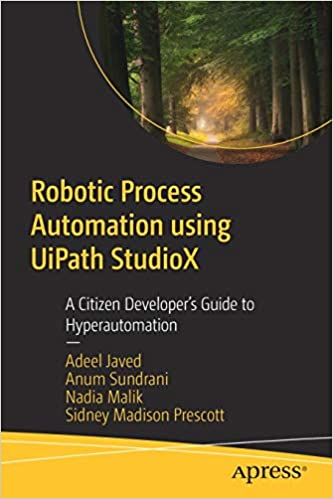
Robotic Process Automation using UiPath StudioX: A Citizen Developer’s Guide to Hyperautomation, by Adeel Javed Et. al. (2021)
Organizations worldwide are implementing RPA to some degree, and there is a shortage of RPA developers on the market. Analysts predict that the RPA market size will be worth $4 billion by 2025.
With UiPath being one of the top players in the RPA industry, professionals and students can explore this book for their own interests in the RPA field.
This book gets you started in your automation journey with a special focus on UiPath, one of the most widely used RPA software tools. Introduction to Robotic Process Automation using UiPath has more detailed information about the various features and functions of the RPA platform UiPath.
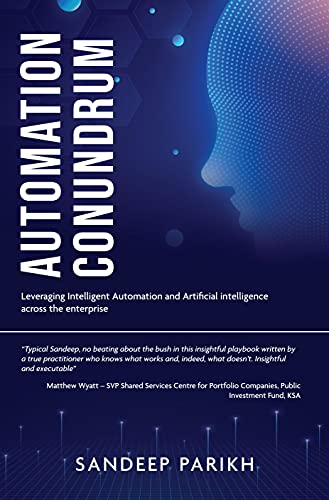
Automation Conundrum, by Sandeep Parikh (2021)
Automation Conundrum takes a look at the ways to exploit contemporary technology. This work explores the stages of intelligent automation beginning with RPA and explains where these actions can be implemented.
IA has effectively demonstrated that it could generate decent company value, and it also has raised specific fears in regards to its influence on society, governments, and regulations. This book also addresses those specific fears.
In summary, the author offers a groundbreaking perspective to hyperautomation, the first step toward the future, rather than an end in itself.
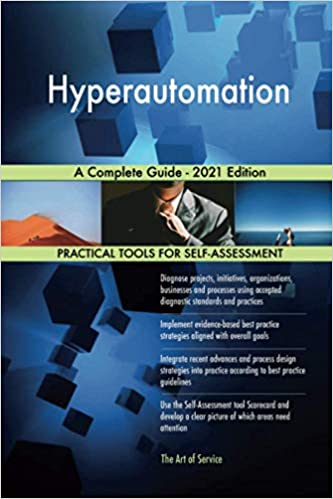
Hyperautomation A Complete Guide, by Gerardus Blokdyk (2020)
This hyperautomation guide is different from literature that you’re used to. If you are looking for a textbook, this may not be for you. This guidebook and its included digital components are for you who appreciates the importance of asking great questions.
Learn about real world hyperautomation projects and businesses. Understand the new trends and recent developments in hyperautomation with proven guidelines. Comprehensive information is included in the book necessary for your broad Hyperautomation Self-Assessment.
Based on Amazon this book considered one of the best hyperautomation books.
Hyperautomation Books – Conclusion
In conclusion, these books are the best when it comes to understanding hyperautomation and its impact on the world. They offer a variety of perspectives and insights that will be beneficial for anyone looking to learn more about this important topic. If you are interested in furthering your understanding of hyperautomation, then these books are a great place to start.
